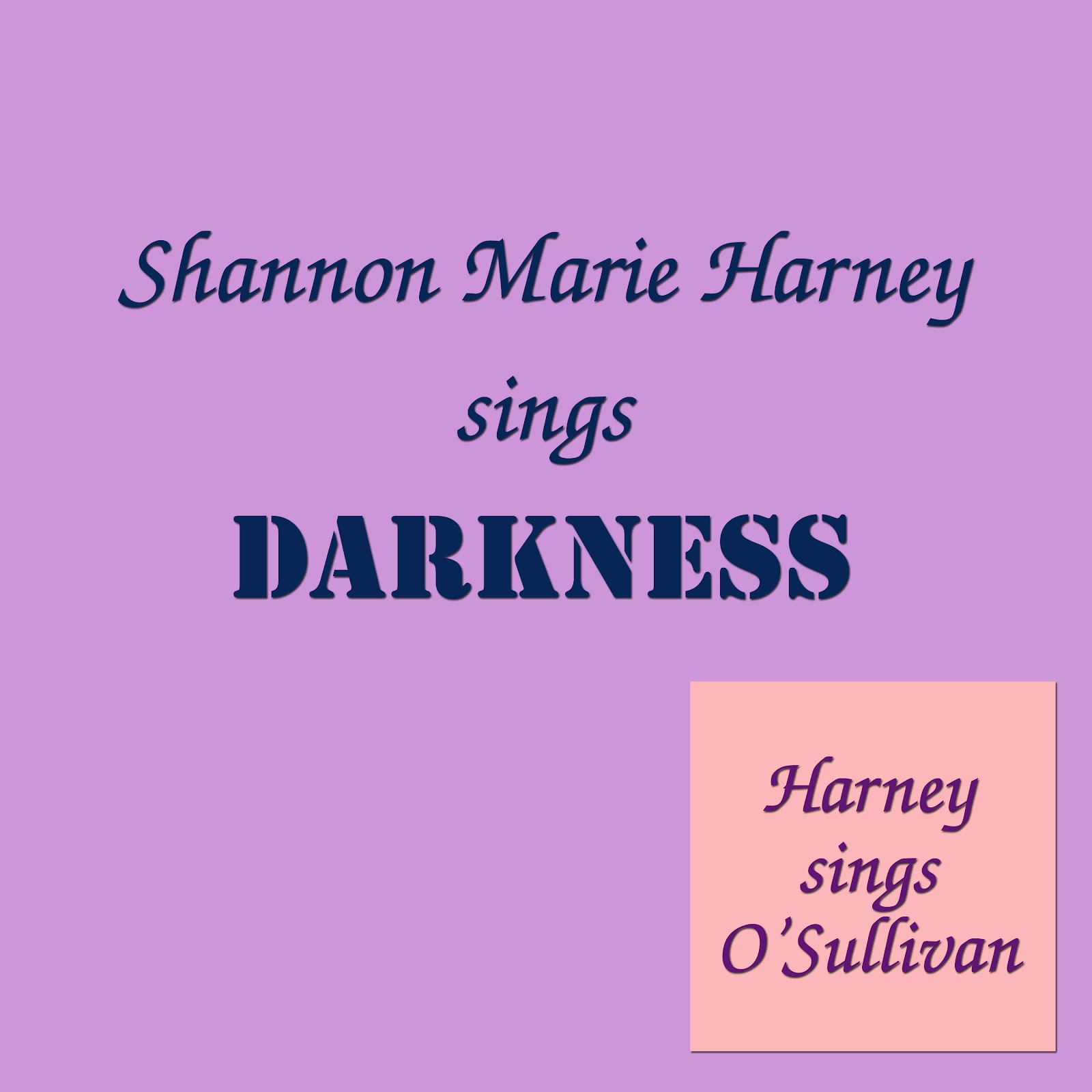Well, yes, since you ask - with this
song, I do know where the ideas came from...
1. I was listening to singer, Shannon Marie Harney, and thinking about writing a new song that would respond to her strengths.
So, reaching into the song bag, I found and wrote 'Darkness'.
And this time, for a number of reasons... Setting the text to music... I did it myself - I heard, emerging from the text, a waltz...
At this point this note on my blog becomes over-complicated - I will leave the complications in place, below, for people who like that sort of thing...
Others can waltz...
2. Certainly we had been thinking about the Great American Songbook - and those songs which, when you analyse them and sing them, have a tiny, pared down, lyric. Like a nursery rhyme.
A thimbleful. Dark matter, compacted by gravity.
The heavy lifting is left to the performer, to the performance, to the music and the arrangement.
Also interesting is the power of repetition, and reprise. On the page my lyric, 'Darkness', looks like 3 identical stanzas, times 2. It would be easy to end up with the same melody times 6.
That is not what the lyric wanted. Lines are repeated, yes, but at each repeat the meaning of the words change. Choreograph that, in waltz time.
3. The first line of the song comes from a play by Samuel Beckett.
This is not 'Godot, the Musical' - though there is a moment in the 'Godot' play where we expect Didi and Gogo to launch into 'The Trail of the Lonesome Pine'.
No, different play.
For reasons which I will not go into here, we are interested in translation - we are in an age of translation. We are interested in the work of translators and interpreters. I have written about this elsewhere, and can return to that theme at a later date.
Academic 'Translation Studies' has become very complex - and now includes a special category, 'self-translators'... Writers who translate their own work from one language to another. Amongst the list of famous names - a surprising number of them are Nobel Prize winners - we always find Samuel Beckett.
The first line of my lyric comes from the Beckett play that is called, in French, 'Fin de partie', and in English - Beckett's translation - 'Endgame'. So, has the meaning changed? The French, end of a game, becomes the English, endgame, the much analysed part of the game of chess that comes before the end?
Towards the end of 'Fin de partie'/ 'Endgame' the main character, Hamm, remembers a poem. He half-remembers a poem, and then corrects himself. He half-remembers a very famous French poem...
Now we have a section where text talks to text, soul to soul.
4.
Fin de partie Samuel Beckett
Hamm:
Un peu de poésie .
( Un temps )
Tu appelais
( Un temps.)
(Il se corrige) ...
TU RECLAMAIS le soir; il vient
( Un temps.)
(Il se corrige) ...
IL DESCEND: le voici
( Un temps.)
Joli ca.
Endgame Samuel Beckett
Hamm:
A little poetry.
(Pause.)
You prayed—
(Pause. He corrects himself.)
You CRIED for night; it comes—
(Pause. He corrects himself.)
It FALLS: now cry in darkness.
(He repeats, chanting.)
You cried for night; it falls: now cry in
darkness.
(Pause.)
Nicely put, that.
(Pause.)
And now?
(Pause.)
(Note:
the French text here is from a secondary source. I need to check it.)
5. The half-remembered poem is by Charles Baudelaire, from Flowers of Evil, 1857. It is called Recueillement, and these are the first 4 lines...
Recueillement
Sois sage, ô ma Douleur, et tiens-toi
plus tranquille.
Tu réclamais le Soir; il descend; le
voici:
Une atmosphère obscure enveloppe la
ville,
Aux uns portant la paix, aux autres le
souci.
You will find tons of comment online, in many languages - and I have excised from this note most of my own comment. In English the title is usually translated as 'Meditation'.
We can explore the suggestion that the language of the poem hints that the poet is talking to 'Douleur', Sorrow, Sadness, as if she were a lover. Or a recalcitrant child.
The poem takes us on a walk, from 'Soir' to 'Nuit' - and one issue in translation is how to translate 'Soir' in line 2. Be still, my O Level French...
Roy Campbell, 1952, goes with 'Dusk. 'Evening', Robert Lowell, 1963. 'Night', Cyril Scott, 1909.
Beckett - or is it Hamm? - has 'Soir' in his French text. And 'Night' in his English.
You CRIED for night - what are you going to do with it? 'Now cry in darkness'.
6. And my lyric begins: 'You can cry, in the darkness...'
Dark matter, compacted by gravity...
See also....
Ecclesiastes 3:1-8
(English Standard Version)
For everything there is a season...
...a time to weep, and a time to laugh;
a time to mourn, and a time to dance...
and Brecht in exile...
In den finsteren Zeiten
Wird da auch gesungen werden?
Da wird auch gesungen werden. Von den finsteren Zeiten.
(From the Svendborg Poems, published in 1939)
[In the days of darkness
Will there be singing then too?
There will be singing then too. About the days of darkness.
(Translation by Sheila Taylor)]
7.
Now, for goodness sake, do not tell any
of this to Shannon Marie Harney...
Just let her sing...
Darkness, Shannon Marie Harney
On Spotify
https://open.spotify.com/album/1397tL51SiVvwZvOzFHJvj
On YouTube
And on every other platform...
Patrick O'Sullivan
December 2022


No comments:
Post a Comment